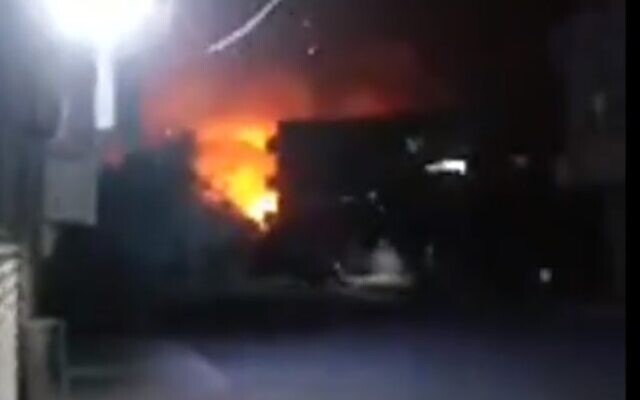Explosions near Hama city in northwest Syria after reported Israeli airstrikes, June 24, 2020
Israel’s airstrikes have killed at least seven pro-Assad troops in east and southeast Syria.
Israeli warplanes attacked positions in Deir ez-Zor and Suweida Provinces late Tuesday. Syrian State news agency SANA said two Assad regime soldiers and five Iran-supported militiamen were killed.
The regime troops were slain in missile strikes on the town of Salkhad near the Jordanian position. The militiamen perished in bombing of Kababej, in the desert west of Deir ez-Zor city.
Early Wednesday, SANA claimed strikes near al-Salamiyah in Hama Province in northwest Syria, declaring that air defense intercepted several missiles.
A different angle of possible ammunition warehouse that was allegedly struck by #Israel|i airstrikes in Salamiyah city located in Hama Governorate this evening. #Syria pic.twitter.com/j7MiQbUvHh
— Joe Truzman (@Jtruzmah) June 23, 2020
Following standard practice, the Israel Defense Forces issued no comment.
Israel has periodically bombed inside Syria throughout the 111-month conflict, and has stepped up attacks on regime, Iranian, and Hezbollah positions this spring.
Tuesday night’s strikes were the fourth in the past month. Twelve people were reportedly killed on June 7 in overnight drone airstrikes on Iran-backed militias in Deir ez-Zor. Three days earlier, nine were slain in attacks in Hama Province on the Scientific Studies Research Center, central in the regime’s conventional and complex weapons programs.
See Syria Daily, June 5: Report — Israel Airstrikes Hit Key Regime Military Complex, Kill 9
Israeli defense officials claimed last mohth that Iran is withdrawing some of its forces from Syria because of the escalation of the strikes: “Syria is paying a growing price for the Iranian presence in its territory, for a war that isn’t [Syria’s]. Iran has turned from an asset to Syria into a burden.”
Defense Minister Naftali Bennett issued a series of warnings:
We have moved from blocking Iran’s entrenchment in Syria to forcing it out of there, and we will not stop….
We are determined, more determined [than Iran], and I can tell you why — for Iran, Syria is an adventure happening 1,000 kilometers away from home. For us, it’s our lives.
Iran’s military support has been essential in preventing Bashar al-Assad’s fall from power. Commanders of the Quds Force, the Revolutionary Guards branch pursuing operations outside Iran, began setting up a 50,000-strong militia in 2012 to prevent the collapse of the regime’s military. In 2013, Tehran backed Hezbollah’s entry into the conflict, and it planned with Moscow in 2015 for Russia’s decisive intervention.

